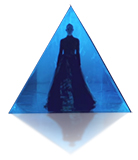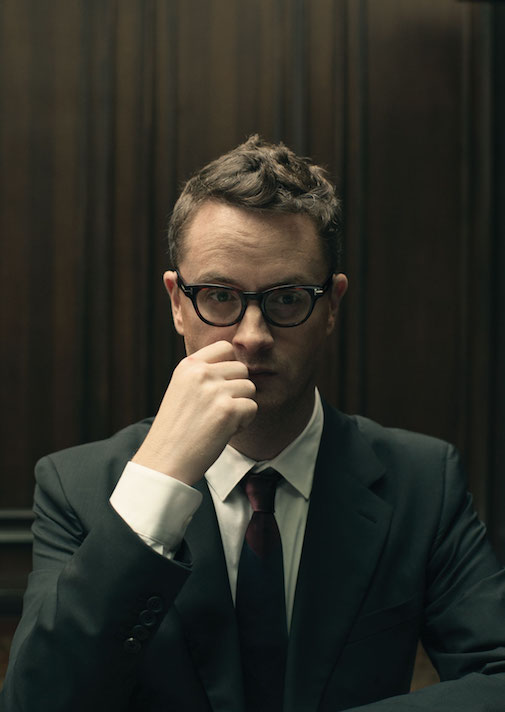 Nicolas Winding Refn. Photographed by Tom Hoops for Lab MagazineNicolas Winding Refn, the Danish auteur whose made a career of candy colored violent films after grimier movies at home, is both exactly what you'd expect and unexpected. The expected: he's a little bit eccentric pacing the room rather than sitting, a little intimidating, and a little impish -- it's difficult to know if he truly means what he says in some instances, or if he has just mastered the art of provocation. The unexpected: he's relatively friendly, surprisingly generous about his collaborators despite the auteur's ego, very tall, thin and surprisingly attractive, something you wouldn't necessarily think since he's so often been photographed with inhuman gods like Ryan Gosling who make everyone but other movie stars look crumpled and basic.
Nicolas Winding Refn. Photographed by Tom Hoops for Lab MagazineNicolas Winding Refn, the Danish auteur whose made a career of candy colored violent films after grimier movies at home, is both exactly what you'd expect and unexpected. The expected: he's a little bit eccentric pacing the room rather than sitting, a little intimidating, and a little impish -- it's difficult to know if he truly means what he says in some instances, or if he has just mastered the art of provocation. The unexpected: he's relatively friendly, surprisingly generous about his collaborators despite the auteur's ego, very tall, thin and surprisingly attractive, something you wouldn't necessarily think since he's so often been photographed with inhuman gods like Ryan Gosling who make everyone but other movie stars look crumpled and basic.
As we talk we find mutual ground in Christina Hendricks adoration ("the perfect woman," he says) but elsewhere it's like he's speaking a foreign language and I don't mean Danish. His films, though quite serious on the surface, betray a dark sense of humor, and yet it still surprises me to hear him drop "I think it would be fun to make a spy movie" as we're saying our goodbyes. Why is this surprising? I couldn't quite tell you but such is the fascination of meeting this singular director, whatever you make of his increasingly divisive movies.
Our interview follows....
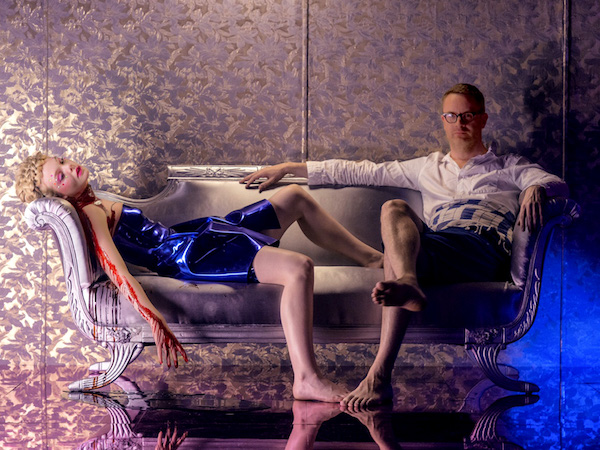
NATHANIEL: Let's talk about your opening scene. It's such a bold tableau. Did you ever worry you were coming on too strong. Like 'how will I top that first image?'
NICOLAS WINDING REFN: I'm setting the stage knowing that, if you look through the film, you'll see the same dynamic in all the other scenes of death and beauty.
NATHANIEL: So you're laying the theme.
NWR: I'm laying the theme right on. Most films -- storytelling in mass media -- start slowly, introducing. Eventually it gets to some kind of dramatic point in the first act. That means the second act is how do we solve it and the third act is resolution. But i don't necessarily believe that's the right order...
I know Godard said it before me that it doesn't have to be in that order. Those rules don't apply anymore. So I wanted to start the movie as much as I was ending it.
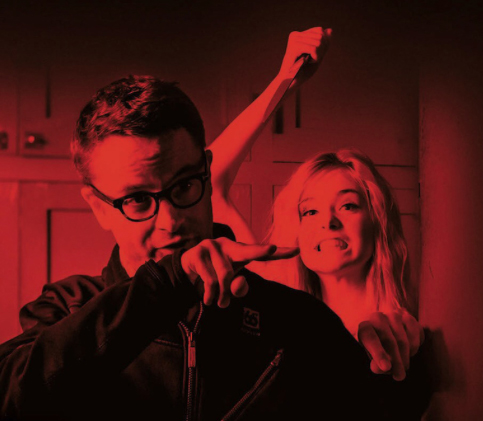 NWR & Elle goofing around on setThe most pleasurable thing about The Neon Demon, and Only God Forgives before it come to think of it, is the intense color. Why are modern directors so scared of color? If you look around at your peers it's all washed-out palettes.
NWR & Elle goofing around on setThe most pleasurable thing about The Neon Demon, and Only God Forgives before it come to think of it, is the intense color. Why are modern directors so scared of color? If you look around at your peers it's all washed-out palettes.
I don't know. I think -- I can't speak for anyone else but, for me, I find great pleasure in heightened reality. Heightened reality, like fairy tales, in a way is so much more of a mirror of everything around us.
In the way genre films can be speak to the way we live.
Absolutely.
Do you worry, though, about being too on-the-nose with symbolism. Like the cannibalistic detour of this particular movie.
The great thing about creativity is there is never too much. It doesn't work like that. There is never a limit.
You never stopped yourself on set to say "no, Refn, that's too much!"?
No, no, no. On the contrary! I'm always like "is there more?"
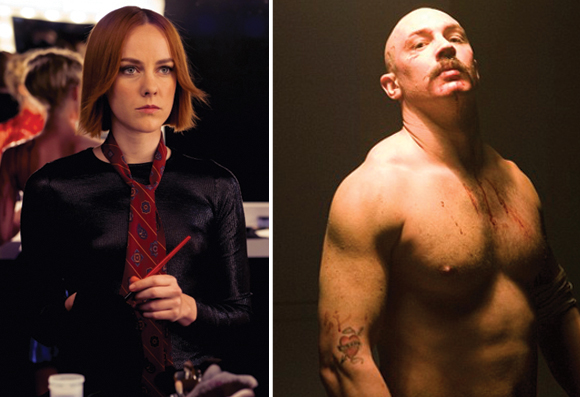 NWR brings out bold work from actors like Jena Malone (Neon Demon) & Tom Hardy (Bronson)
NWR brings out bold work from actors like Jena Malone (Neon Demon) & Tom Hardy (Bronson)
NATHANIEL: Is it easy for you to convince actors to really 'go there' in your movies? Some of your actors have been -- well Tom Hardy is naked through most of Bronson and the things Jena Malone does in this movie...
NICOLAS WINDING REFN: I think I've been very lucky most of all to work with actors who are so bold and willing to use their bodies as devices. You don't get any bolder than Jena Malone. Fucking hell, what an actress.
Was there any improv or was her work all on the page?
I had just written "she kisses a corpse" and that was it. She took it from there. That takes a lot of guts. Everyone wants to be nice. Nice means pleasant. Pleasant is not interesting in my opinion.
You've used some of the same people repeatedly, like Christina Hendricks for which I have to thank you because I have NO idea why Hollywood isn't leaping on every chance to work with her. I just don't understand it.
My wife and I were just talking about how fucking amazing she is. Actually she was the first actress I hired for the movie, even before there was a script. Three years ago I was having dinner with her and Bryan Cranston in L.A. I had just shot Only God Forgives and I was talking about what I wanted to do next. [Recreating the conversation] 'I think I want to do a horror movie'. 'Oh what's it about?' 'Blood and high heels.'
She said "I'm in!"
That's all it took?
Yeah.
[Laughter] Are you usually involved in casting like that.
Very much. Half of the movie is casting. You find the lead actress or actor and you cast around that. That's where the equation has to be.
Did this film originally have a different title? Was this the project that was originally for Carey Mulligan?
I decided to do something else. It's kind of a mutation. It usually happens that I change directions halfway through.
A lot of the talk about this movie is your portrayal of women. I know your wife made a documentary about you. Did you consult with her at all on this? The fashion world is a hotbed for gender politics. Are you worried about perceptions of misogyny and catfights and all of that?
No. Misogyny doesn't exist in The Neon Demon because the whole film is about women in a world where men don't function. The men in Neon Demon are not there as characters. They're there like girlfriends are in other movies: plot points. My wife saw the movie and 'thumbs up'.
It seems like you're paring down as you go. Your films are getting more and more dialogue free. Do you love conveying story without dialogue?
I think the origin of cinema is the camera and a piece of music. I'm very interested in that language. The digital world has allowed film to be reinvented. I like it because you retain the poetry.
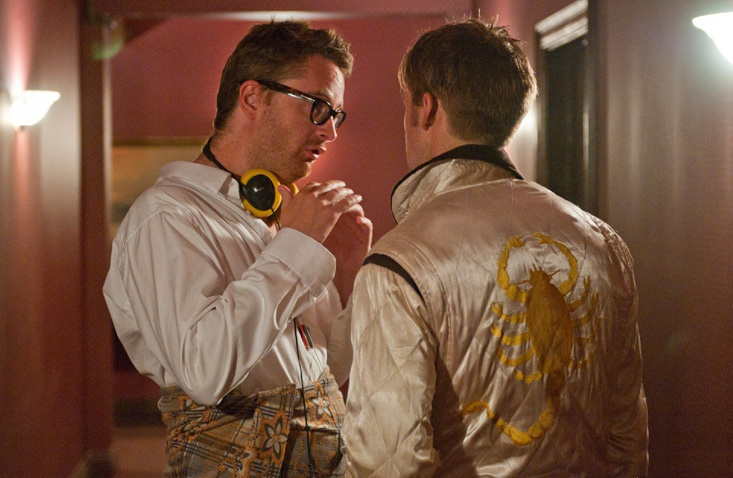 on the set of Drive with Ryan Gosling
on the set of Drive with Ryan Gosling
Can you elaborate on what digital means to you?
The digital revolution is a canvas that allows opportunity. There's no regulation or control. The ecosystem of entertainment is that there are very few people who control the outlet and the distribution. Because there's so much money in filmmaking, obviously there's an interest in maintaining the highest profit. Therefore you need to make pure consumerism. There's nothing wrong with that -- believe me I love those movies -- but I don't think that's why film was invented as an artform.
So you think of it as a mode of personal expression.
Yeah. The future is not about what you make but what you stand for.
Your aesthetics are very strong and consistent but I'm curious. Erin Benach, the costume designer who did Drive. I'm glad that you're working with her again but I've noticed you don't always use the same time the way so many auteurs do.
No. The only same people I use are Cliff Martinez the composer and Matt Newman the editor. Everyone else I change because it challenges me. I'm interested in other views, as much as I can get my hands on.
You want that input?
As much as I can get. I don't ever want to repeat myself.
So why is the editor always the same then?
Because editing is all about structure. You need someone that knows you, that you trust, because that's a lot of the game is 'how do we structure it.' And the music is because Cliff is so fucking good.
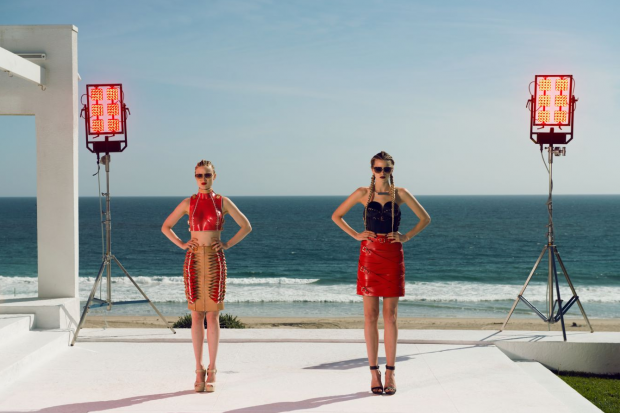
You can trace the aesthetic and violent throughline from your recent movies to The Neon Demon but it's kind of a departure, too. All your other movies were very male protagonist focused. This one is (practically) all female. Was that a conscious choice or...?
It was a combination. Consciously I wanted to do something completely different. Coming from Drive which was a love story pure and simple, it's really what it boils down to. That film is very much like 'What would I do for my one and only wife?' And Only God Forgives was about emasculating all that homoeroticism that Drive essentially became. Well, now -- now I want to be a sixteen year-old girl!
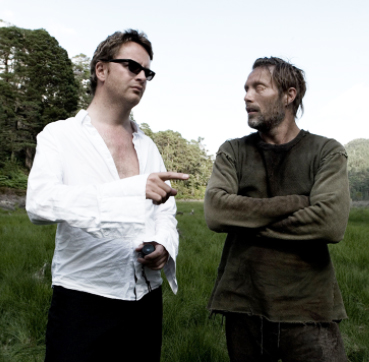 Nicolas Winding Refn & Mads Mikkelsen on the set of Valhalla Rising (2009)So you always put yourself in the characters?
Nicolas Winding Refn & Mads Mikkelsen on the set of Valhalla Rising (2009)So you always put yourself in the characters?
Always! I can only make films -- I'm very openly self indulgent when I work. Everything has to lead back to me. It's not that I don't collaborate -- everyone brings wonderful ideas that are better than mine but everything has to lead back to the inner canvas.
So are you all the characters or is the lead character your proxy?
My lead character whether it's Elle Fanning, Ryan Gosling, or Mads Mikkelsen, is always the inner me. You can say that Mads was the first male alter ego that I had. We did three movies together, his best movies. Tom Hardy was like -- he became my biography. Then I met Ryan and he became the man I always wanted to be.
Do you want to work with Mads again?
Absolutely. He's great. Even though he didn't give me the Palme D'Or, I've forgiven him.
